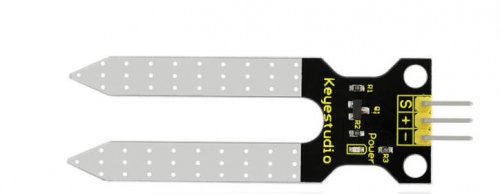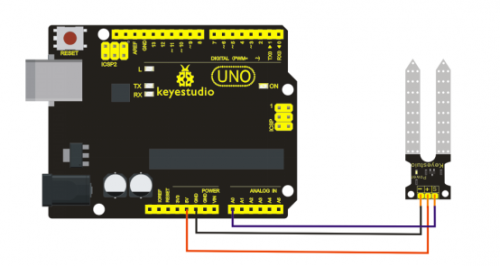Ks0049 keyestudio Soil Humidity Sensor: Difference between revisions
Keyestudio (talk | contribs) |
Keyestudio (talk | contribs) |
||
| Line 6: | Line 6: | ||
The sensor is set with two probes inserted into the soil, then with the current go through the soil, the sensor will get resistance value by reading the current changes between the two probes and convert such resistance value into moisture content. The higher moisture (less resistance), the higher conductivity the soil has. | The sensor is set with two probes inserted into the soil, then with the current go through the soil, the sensor will get resistance value by reading the current changes between the two probes and convert such resistance value into moisture content. The higher moisture (less resistance), the higher conductivity the soil has. | ||
The surface of the sensor have undergone metallization process to prolong its service life. Insert it into the soil and then use the AD converter to read it. With the help of this sensor, the plant can remind you: I need water. | The surface of the sensor have undergone metallization process to prolong its service life. Insert it into the soil and then use the AD converter to read it. With the help of this sensor, the plant can remind you: I need water. | ||
<br>[[File: | |||
<br>[[File:KS0049.jpg|500px|frameless|thumb]]<br> | |||
==Specification== | ==Specification== | ||
Revision as of 13:41, 19 April 2018
Introduction
This is a simple soil humidity sensor aims to detect the soil humidity. If the soil is in lack of water, the analog value output by the sensor will decrease, otherwise, it will increase. If you use this sensor to make an automatic watering device, it can detect whether your botany is thirsty to prevent it from withering when you go out. Using the sensor with Arduino controller makes your plant more comfortable and your garden smarter.
The soil humidity sensor module is not as complicated as you might think, and if you need to detect the soil in your project , it will be your best choice.
The sensor is set with two probes inserted into the soil, then with the current go through the soil, the sensor will get resistance value by reading the current changes between the two probes and convert such resistance value into moisture content. The higher moisture (less resistance), the higher conductivity the soil has.
The surface of the sensor have undergone metallization process to prolong its service life. Insert it into the soil and then use the AD converter to read it. With the help of this sensor, the plant can remind you: I need water.

Specification
- Power Supply Voltage: 3.3V or 5V
- Working Current: ≤ 20mA
- Output Voltage: 0-2.3V (When the sensor is totally immersed in water, the voltage will be 2.3V) 5V power supply,the higher humidity, the higher the output voltage
- Packaging : Electrostatic bag sealing
- Sensor Type: Analog output
- Interface Definition: Pin1- signal, pin2- GND, pin3 - VCC
- Service life: About one year (gold-plated surface for enhancing conductivity and corrosion resistance )
- Module Size: 20X60mm
Connection Diagram
Sample Code
/*
# Example code for the moisture sensor
# Connect the sensor to the A0(Analog 0) pin on the Arduino board
# the sensor value description
# 0 ~300 dry soil
# 300~700 humid soil
# 700~950 in water
*/
void setup(){
Serial.begin(57600);
}
void loop(){
Serial.print("Moisture Sensor Value:");
Serial.println(analogRead(0));
delay(100);
}
Resources
Video
http://www.keyestudio.com/wp/2016/05/ks0049-keyestudio-soil-humidity-sensor/
https://drive.google.com/open?id=1Hp8-9BQQKJiEujkw-uQ0XHQxN2jccTgU
Buy from
Official Website
http://www.keyestudio.com/keyestudio-soil-humidity-sensor-for-arduino.html
Amazon Store
